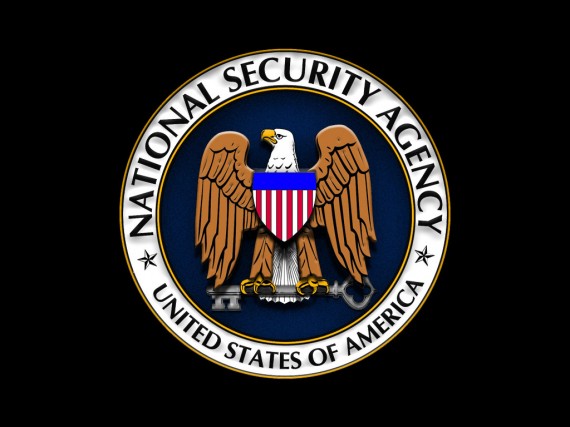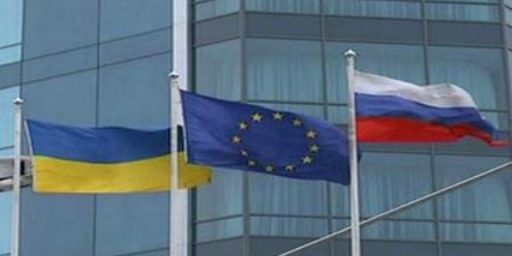Revelations About NSA Surveillance Souring U.S. Relationships With Other Nations
The latest revelations about National Security Agency surveillance outside the United States have caused quite an uproar overseas.
Earlier this week, The Guardian published the latest revelations from the files of Edward Snowden, namely that the National Security Agency had monitored the communications of up to 35 world leaders, including some of America’s closest allies in Europe. We’d already learned some of this with the news that German Chancellor Angela Merkel had personally called President Obama after news leaked of alleged NSA monitoring of her phone call, a phone call which resulted a White House statement that made it rather obvious that the U.S. had indeed monitored Merkel’s phone conversations in the past. Needless to stay, these revelations have put the United States in an uncomfortable position on the world state:
The NSA spying controversy is quickly transforming from a domestic headache for the Obama administration into a global public relations fiasco for the United States government.
After months of public and congressional debate over the National Security Agency’s collection of details on U.S. telephone calls, a series of reports about alleged spying on foreign countries and their leaders has unleashed an angry global reaction that appears likely to swamp the debate about gathering of metadata within American borders.
While prospects for a legislative or judicial curtailment of the U.S. call-tracking program are doubtful, damage from public revelations about NSA’s global surveillance is already evident and seems to be growing.
Citing the snooping disclosed by former NSA contractor Edward Snowden, Brazil’s president canceled a state visit to the U.S. set for this week. Leaders in France and Italy and Germany have lodged heated protests with Washington, with the Germans announcing plans to dispatch a delegation to Washington to discuss the issue. Boeing airplane sales are in jeopardy. And the European Union is threatening to slap restrictions on U.S. technology firms that profit from tens of millions of users on the Continent.
“Europe is talking about this. Some people in Europe are upset and may take steps to block us,” former Rep. Jane Harman (D-Calif.) said in a telephone interview from Rome on Friday. “The reaction of retail politicians is to mirror the upset of the people who elected them.”
“Confidence between countries and confidence between governments are important and sometime decisive and there’s almost no confidence between the United States of America and Europe” now, former German intelligence chief Hansjörg Geiger said. “I’m quite convinced there will be an impact…. It will be a real impact and not only the [intelligence] services will have some turbulence.
Some analysts see immediate trouble for U.S.-European arrangements to share information about airline passengers, financial transactions and more.
“The bigger problems are not in Berlin or Paris, but in the future out of Brussels,” said Michael Leiter, former head of the National Counterterrorism Center. “At the EU, I expect them to be very, very resistant to any increase — and to have problems even with maintenance—of some of the information sharing we have now…..All of this complicates those discussions exponentially.”
Leiter said the issues with Germany and France will likely pass, but that U.S. efforts to boost ties with rising powers could be rocky for some time. “It’s much more troublesome for rapidly emerging powers like Brazil,” he said. “They’re critical partners and we don’t have the same long-term, deep national security ties and I think this really does make it hard for us.”
Some analysts say the slow-to-build but intensifying damage overseas was predictable, but not really avoidable because of the legal structure the U.S. uses for vacuuming up communications. While the effectiveness of the controls are debated, collection of intelligence on U.S. soil and about U.S. citizens is regulated by the courts and by intelligence agency policies. Foreigners outside the U.S. are basically considered fair game for American intelligence agencies, with no legal restrictions and few other limits.
The reports are also leading to calls for talks between the U.S. and its European allies over their intelligence relationship, and claims that the revelations have led to a lack of trust:
Early on Friday, Chancellor Angela Merkel of Germany and President François Hollande of France emerged from a meeting of European leaders to call for talks with the United States on new rules for their intelligence relationship. A statement from the European leaders said a “lack of trust” could undermine trans-Atlantic intelligence cooperation.
Earlier in the week the European Parliament had acted to suspend an agreement with the United States that allows it to track the finances of terrorist groups, citing suspicions that the United States authorities were tapping European citizens’ personal financial data.
The disclosures contained in the documents leaked by the former National Security Agency contractor Edward J. Snowden have crystallized a growing sense in Europe that post-Sept. 11 America has lost some of the values of privacy and accountability that have been the source of the world’s admiration for its version of democracy.
So fierce was the anger in Berlin over suspicions that American intelligence had tapped into Ms. Merkel’s cellphone that Elmar Brok of Germany, the chairman of the European Parliament’s foreign affairs committee and a pillar of trans-Atlantic exchanges since 1984, spoke Friday of America’s security establishment as a creepy “state within a state.”
Since Sept. 11, 2001, he said, “the balance between freedom and security has been lost.”
To be sure, the United States and Europe are like a bickering couple that will never break up. For all the sharp words, they cannot even begin to contemplate an actual divorce. Many of the European complaints about the United States also seem directed mainly at a domestic audience, and may not result in concrete changes to a relationship that has weathered many storms.
But the United States under Mr. Obama had lost a considerable amount of European patience and good will even before the latest round of disclosures from the leaked N.S.A. documents.
First came the diplomatic shambles over Syria, where, in late summer, the United States seemed poised for military action after the killing of hundreds by chemical weapons. France keenly backed America, as did Britain’s prime minister, David Cameron. But Mr. Cameron unexpectedly failed to get support from his Parliament, Mr. Obama wavered, Russia stepped in with a last-minute diplomatic solution that left Germany and other nations diplomatically bruised, and France was left hanging out to dry.
Barely had the trans-Atlantic partners gotten over that discomfort than the divisive partisan politics of Washington precipitated a government shutdown and brought the United States — and thus Europe and the world — to the brink of default and economic turmoil.
This week, two American ambassadors, Charles H. Rivkin in France and John B. Emerson in Germany, were summoned to the Foreign Ministries in Paris and Berlin for a dressing down by two of America’s closest friends. The depressing spectacle reversed the traditional roles played by Europe and America, certainly for Germany. France is a proud nuclear power, and while relations have been exceptionally warm in recent years, it is strongly independent and a frequent critic, particularly of American culture.
Still, it was unusual to hear the foreign minister, Laurent Fabius, lecture so sternly.
“This sort of practice between partners that invades privacy is totally unacceptable, and we have to make sure, very quickly, that this no longer happens,” he said. “We fully agree that we cooperate to fight terrorism. It is indispensable. But this does not justify that personal data of millions of our compatriots are snooped on.”
It’s easy to dismiss a lot of this with the old “everybody does it” defense, especially since that is largely true when it comes to allies like France and the United Kingdom. At the same time, though, when it comes However, many analysts say that this defense isn’t likely to work anymore:
“Sure, everyone does it, but that’s been an N.S.A. excuse for too long,” one former senior official who talks to Mr. Obama often on intelligence matters said Friday. “Obama has said, publicly and privately, that just because we can do something doesn’t mean we should do it. But everyone has moved too slowly in moving that from a slogan to a policy.”
Diplomats at the United Nations on Friday said that Germany and Brazil, two of the countries whose leaders have been subjected to N.S.A. invasions of their communications, were drafting a General Assembly resolution that would seek to strengthen Internet privacy.
The diplomats, who spoke on the condition of anonymity because the drafting is still in the early stages, said momentum for the measure, begun in the summer, had been invigorated by the most recent disclosures of American eavesdropping. A formal resolution could be ready for consideration next month in what would be the first internationally coordinated response to the N.S.A. spying. Word of the German-Brazilian initiative was first reported on the Web site of Foreign Policy.
In Europe, where Ms. Merkel and Mr. Hollande demanded Friday that the United States open negotiations on a “code of conduct” that would limit surveillance, there is a sense that the steady stream of revelations may give them an upper hand. Ms. Merkel keeps repeating the phrase that the Americans must “restore trust.” One way the French and Germans intend to do that is to seek some form of inclusion in the inner circle of American intelligence allies, or at least for a deeper intelligence alliance.
Right now that inner circle, called the “Five Eyes,” consists of the United States and four English-speaking partners: Britain, Canada, Australia and New Zealand. Those partners agree not to spy on one another and to share in many of the United States’ deepest intelligence secrets, as the trove of highly classified documents made public by Edward J. Snowden, the former N.S.A. contractor, makes clear.
In some sense, of course, much of the manuvering by the Germans and the French is motivated as much by the reaction of their own populations to the revelations about NSA spying as anything else. When the stories about the NSA collecting communications data from private citizens in Europe first became public over the summer. Indeed, there were several protests about the matter both leading up to and during President Obama’s last trip to Europe. It seems quite clear, though, that this is about more than just foreign leaders making statements designed to placate their populations. Stalwart American allies are beginning to question our credibility on privacy issues and our assurances that the information being collected is being used solely in the fight against international terrorism rather than for purposes such as industrial espionage, and that the NSA is taking proper steps to ensure that the privacy of most Europeans is being safeguarded just as the NSA purportedly is legally obligated to ensure the privacy of American citizens. This is why you see them taking the steps that they are now.
Will the Germans, French, and others really push this as far as they seem to be implying? That remains to be been. For the moment at least, though, it appears that U.S. credibility in the rest of the world has suffered some real damage from these revelations, and that’s going to make intelligence gathering more difficult going forward.







NSA has behaved like a kid with a shiny new toy. No thought for the consequences of their actions, no regard for the potential blowback, they do things just because they can. There is nothing we could have gotten from Merkel’s phone that was worth this, certainly not the revelation that anti-terrorist programs are being used to target people who could not possibly represent a terrorist threat. It’s abuse by dunderheads who will never be held accountable.
Most of the foreign complaints are for their own citizens, rather than any genuine outrage or surprise. I would suspect that the real complaint isn’t that we’re restyling, but that we have been indiscreet about it — along with a worry that whatever we have discovered will be publicly revealed.
@Gustopher:
Good point, but it’s not that we have been indiscreet. One guy was indiscreet. And he now lives as a fugitive in Russia.
Transparency is good when it comes to finance and normal day to day political machinations. In the spy world, it’s neither appropriate or desired. Especially when its enforced by a self-appointed arbiter of our best interests like Snowden.
If the other nations of the world could get over the disastrous Bush administration as well as the Iraq debacle, they’ll be able to get over this too…
All those “outraged” countries are entitled to this special moment of kabuki. I look forward to those victory parades for Ed Snowden – perhaps, he can be feted in Berlin at the Brandenburg Gate, or maybe a march down the Champs-Elysees?
Oh, no! The Europeans are mad that we have tech toys they don’t! Oh, woe is us, how will we survive?
Now the Europeans will turn on us and show their displeasure by doubling their defense budgets and paying their own way!
Yeah.
Europe exists today because the United States of America, our soldiers and our taxpayers made it so. Europe lives in a little cradle we built for them. They have the safety and security and stability we gave them. And they still rely on us, they still have us watching their backs and they are only at peace with each other because like the adult wading into a fight between middle-school kids, we stopped them killing each other.
And now they’re angry? Awwww. So sorry. Tell you what, Europe, pay us back the hundreds of billions of dollars we’ve spent sustaining your little world and we promise to send you a Hallmark card expressing our deep remorse.
@michael reynolds:
If is kind of fun to read all of the progressives playing defense for the Obama Administraiton. A few years ago progressives kept describing the GW Bush Administration as a criminal enterprise and progressives criticized how badly GW Bush had alienated Europe.
Now we have progressives defending every action of the Obama Adminstraiton and claiming that the opinions of European leader just do not matter.
Certainly that is a lot more fun than reading your constant droning drivel about the “coming one-party state” as well as your other racist-tinged nonsense…
@superdestroyer:
Wrong, as usual. Notice the downvotes on my comment? My indifference to the opinions of Europeans has the same basis as my indifference to my 16 year-old’s opinions on my choice of car. Basically: don’t live off my hard work and then give me sh!t about it.
For the record, I love Europe. I was raised part of my life in France and attended French schools for three years. Just a few years back we moved the whole family to Italy for 8 months. I’ve also lived in Portugal and visited Europe more times than I can easily recall.
But these are the people who could not be bothered to literally drive down the freeway to deal with Bosnia and Kosovo and had to rely on Americans flying in from 5000 miles away in North Dakota to handle their mess for them.
@michael reynolds: good point- and another reason why we don’t want to turn into europe. heck, if we didn’t have so many troops and hardware over there they’d have already started ww3,4,5….
You really need to get over yourself…that battle has already been waged and your side has lost…we already have many of the things that those horrible Europeans have and none of that is going away, despite the efforts of people like Paul Ryan…
The U.S. spies on other countries? No way!
@An Interested Party:
Once again Progressives refuse to actually the almost daily data that shows that the U.S. is headed to being a one party state. It is amazing to me that progressives acknowledge that every demographic and political trend is going the way of the U.S. being a one party state but somehow believe that an unnamed white knight is going to come along and have leadership skills and charisma that is totally absent from politics these days and lead the Republicans back to relevancy.
Look at the difference between the realist on the left who admit that comprehensive immigration reform is be bad for conservatives and Republicans and those insincere progressives who claim that immigration reform will help the Republicans.
@michael reynolds:
Of course, the Europeans could say the same about the United States – and I suspect you’re too knowledgeable of the centuries long history of Europe and the United States to really think otherwise. Without Europe, North America would look very different today.
And I suspect it’d be very easy to make an argument that if the US hadn’t gotten involved in WW2 then Europe would in fact still exist, just in a form that would be radically different, harmful to both its citizens and the rest of the world, including the US. The US got involved mainly to protect its interest, and kept involved after the war for the same reason. Of course, the same was true in the past when say France helped the US against Britain during the revolution.
Having said that, I agree that since WW2 the Europeans have gained more from the US than vice-versa. But that balance has swung back and forth, and I’d bet they will do so again as the centuries unfold.
As for the spy thing, that’s just leaders playing a role to impress their citizens. The history of spying in Europe (and the rest of the world) makes their indignation comical.
I’ve thought of another spy story and how the comparison with the European reaction to the NSA leaves the GHWBush administration looking pretty weak in it’s response to the Jonathon Pollard spying ‘problem’. Makes one wonder what the reaction of our allies would be if we destroyed one of their ships on the high seas, like — for example — the Israeli Air Force destroyed the USS Liberty.
Maybe we’re so used to being treated badly by our so-called ‘ally’ in the middle east that it seemed reasonable that the Germans, French and all would have almost no objection.
The problem with agencies like the NSA and the military is that it’s always easier to find arguments to spy on people rather than not spy on people.
My impression is that a lot of the people working at the NSA have more “patriotism” than brains.
@superdestroyer: I’m at a loss for why you keep droning on and on about a one-party state. What would you have democrats and leftists do, vote Republican?
If you think those of us on the far left aren’t critical of the President and Democratic policies, there’s no prescription for your delusion. But I’ll be damned if I ally myself with teabag facists just to prove to people like you that I don’t strongly disagree with policies that the Democratic party and Obama administration defend.
Oh, and no one with a scrap of sense thinks that Republican support for immigration reform will instantly make their policies palatable to Hispanic voters. But knee-jerk opposition to reform will ensure that Republicans will cement the Hispanic vote as Democrat, much like what took place with the CRA. You can’t undo what has been said and done in regards to immigration, but you can either move in the right direction and hope it pays dividends in the long-term or you can double-down on the hysteria and become obsolete with Hispanics.
@george:
Absolutely. For a start, our own independence was very much a gift from the French Navy and various French supporters.
My beef with what we’re referring to as “the Europeans,” but which is actually just Germany (because the Brits are doing the same thing, and so is France,) is that you can’t task daddy with all the hard work and expense of defending the western world and then bitch about the details of how daddy gets it done. Basically, step up or shut up.
@michael reynolds: Unfortunately, that sort of logic allows for the lesser holders of power to be constantly bullied. It’s also plenty stupid: for whatever reason would to US have to spy on Merkel? It carries the flavour of a security guard peeping in via CTV in women’s locker rooms, simply “because he can”
Uh..spying on Merkel began in 2002, putting it squarely on…Bush once again.
I liked the response to this issue by the dutch ‘Speld’ (a The Onion type website with similar popularity): “Dutch government wants to know why Rutte (the dutch PM) wasn’t bugged”. In the website’s fake universe, the dutch have asked the USA ambassador for an explanation regarding the fact that our PM wasn’t bugged when so many others were, and the dutch parliament has called for our PM to use more dangerous words in his phone calls. The official statement by the dutch PM: “North Korea, Nuclear Weapons, Tango, One Three Eight Nine”
We, the dutch, so desperately want to be of international importance that it’s an apt parody.
@Nikki: Given some of Bush’s other behavior towards Merkel *cough* “shoulder massage” *cough* I’m starting to seriously wonder whether Bush didn’t request this sort of eavesdropping in the first place.
That’s part of the reason why this sounds really, really creepy, especially if you’re female.
It’s unfortunate, but it’ll pass. A lot of the outrage is faux outrage (the people of these countries might be pissed. The governments… meh, maybe a little, but come on. Do we really think they’re shocked?).
The NSA is a spy agency. This is kinda what they do. Did they overstep? Well, given that this stuff started soon after 9/11, I’d be surprised if they hadn’t.
While I’m concerned about NSA overreach, I view spying as lower down on the priority list than, say, torture or acts of war that kill lots of people. Which we’ve done and are doing as well.
@Nikki: nice try, doesn’t hold water but again, nice try. it’s 5 yrs into the obama regime, he has to know something that’s going on in the world…..he’s “smart”, remember?